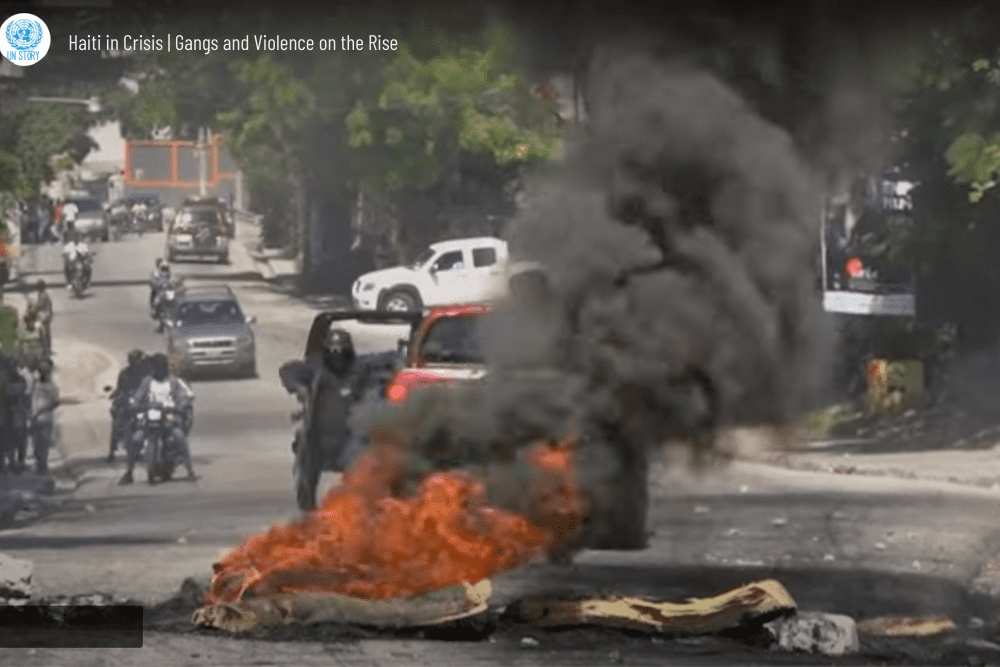The Kenyan government has volunteered to lead an international force in Haiti and will deploy 1,000 troops to the Caribbean country
The United Nations Charter has authorized the deployment of the Multinational Security Support Mission (MSSM) to Haiti. The resolution, which was passed on Monday, October 2 2023 recognizes that the ongoing situation, in Haiti poses a risk, to peace, security and stability in the surrounding region.
The Haitian government has been asking for a mission to restore order for a year. Kenya has said it is ready to send 1,000 police officers, an offer welcomed by the United States and other countries reluctant to send their own troops to this risky terrain. Around 2,000 individuals are set to be deployed to Haiti by the end of January 2024 including 1,000 police officers from Kenya. Their primary objective will be to assist the Haitian National Police in dismantling gangs and restoring order throughout the country.
Additionally a thousand police and military personnel from Caribbean nations such as Jamaica, Bahamas, Suriname, Barbados and Antigua are expected to join forces with Kenyas contingent. Approved by the UN this international mission is significantly lower compared to previous peacekeeping efforts made in Haiti.
During the UN intervention in 1994 led by the United States there were up to 21,000 soldiers involved. The primary objective at that time was to reinstate Jean Bertrand Aristide as the elected president, after his overthrow three years prior.
In 2004 a multinational mission, under the leadership of Brazil consisted of 13,000 individuals. This mission concluded in 2017 following a series of scandals involving peacekeepers (such as incidents of rape, sexual assault and engagement with prostitutes). Accusations against a camp associated with the Nepalese contingent, for introducing cholera (which resulted in nearly 10,000 deaths) all while failing to achieve its intended goals. The primary objective was to dismantle gangs promote police and judicial system reform while maintaining peace and stability.
Fear of abuses by the international force
Many human rights groups are concerned, about violations as the Kenyan police have been accused of committing abuses, within their own nation.
NGOs, on the ground have been reporting instances of corruption, use of force arbitrary arrests and even summary executions. Amnesty International has expressed concern over the perceived methods employed by the Haitian police drawing parallels to those of the Kenyan police. They fear a violation of human rights.
This situation presents a risk since this mission while supported by the UN is not directly controlled by the body. Kenya holds authority in this regard.
Regarding this matter the United States seeks to provide reassurance. As a financier of the mission they propose implementing a monitoring mechanism to prevent any abuses. However further details on this mechanism have not been disclosed. Additionally Washington emphasizes Kenyas experience, in peacekeeping missions in Somalia and the Democratic Republic of Congo.
Fear of Gangs
The head of the G9 gang Jimmy “Barbecue” Chérizier, who used to be a police officer issued a statement stating that the international force would be received warmly only if it came “to arrest the Prime Minister and help us restore order”. Otherwise, the man considered one of Haiti’s most powerful men says he is ready to fight “to the bitter end”.
In order to effectively address the issue of armed groups, which reportedly have control, over 80% of the capital the mission will need to take action within working class neighborhoods and shantytowns. This will require cooperation with a police force that has experienced a considerably decrease, in its workforce in recent years.
Currently the number of police officers, on duty has dropped to less than 9,000 showing a decrease from the previous count of 16,000 officers in 2021. In populated areas like these any form of intervention carries risks due to criminals extensive knowledge of the terrain.
Considering these circumstances and taking into account the challenge international force in Haiti face in distinguishing between bandits and local residents it appears that the international mission is grappling with a power balance.
All the more so since the population is arming itself. As, per the United Nations there have been incidents where militias and groups claiming to be “self defense” have caused the death of over 350 individuals since April due, to the prevailing sense of insecurity. There have been extremely brutal acts of revenge, with gang members being burned alive in the street.
Read more:
Rights chief calls for international help to provide ‘way out of chaos’ in Haiti







